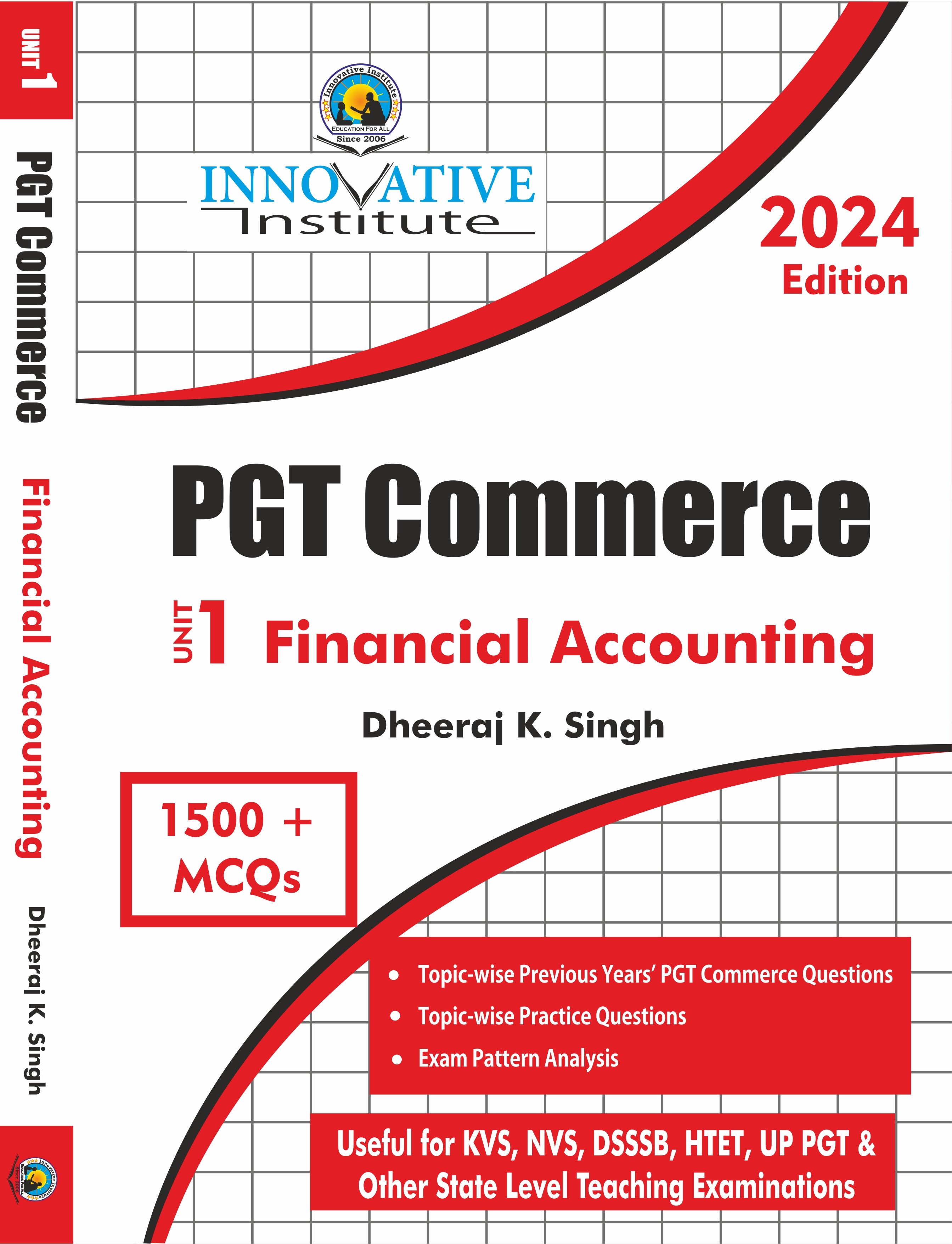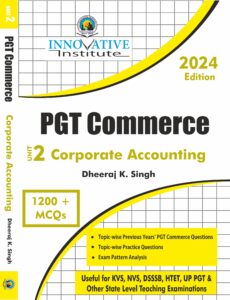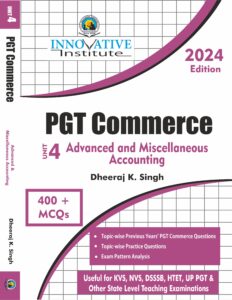Description
Sample Book
Andhra Pradesh PGT Commerce Books Combo Set of 5 Books
| Unit |
Name of Book |
Author |
No. of Pages |
No. of MCQs |
| 1 |
Financial Accounting for PGT Commerce |
Dheeraj Kumar Singh |
270 |
1500+ |
| 2 |
Corporate Accounting for PGT Commerce |
Dheeraj Kumar Singh |
246 |
1200+ |
| 4 |
Advance & Miscellaneous Accounting for PGT Commerce |
Dheeraj Kumar Singh |
112 |
400+ |
|
Business Studies for PGT Commerce |
Dheeraj Kumar Singh |
262 |
880 |
| |
Management for PGT Commerce |
|
|
|
Financial Accounting
Corporate Accounting
Advance & Miscellaneous Accounting
Business Studies
Syllabus
1. Business Studies And Management
- Introduction to Business– Concepts, characteristics, objectives. Classification of business as industry and commerce. Distinctive features of business – Business, profession and employment. Choice of Form of Organization .Large Scale and Small Scale Business-.Assistance by Government to Small Scale Sector and Micro enterprises.
- Form of Business Organizations – Sole Proprietors, Joint Hindu Family, Partnership, Joint Stock Company and its formation, Cooperative organization.
- Business ownership– Private, public and Joint sector. Public Enterprises, Role-dynamics of Public Sector, Global Enterprises (Multinational Companies), Joint Ventures.
- Business Services – banking, insurance, transportation, warehousing, communication, Impact of Technology on Business Services.
- Trade: Internal Trade – Retail and Wholesale trade, Emerging modes of business-franchising, E-business and Outsourcing. International Business– Export-Import – Procedure and documentation, EPZ/SEZ. International
Trade Institutions and Agreements – WTO, UNCTAD, World-Bank, IMF, GATS (General Agreement of Trade in Services).
- Business Finance: Sources – owners and borrowed fund, Sources of raising finance, Equity and preference Shares, GDR( Global Deposit Receipts), ADR (American Deposit Receipts), Debentures, Bonds – Retained Profit,
Public Deposits, Loan from Financial Institutions and commercial banks, Credit-rating and rating agencies, Trade credit, Micro-credit.
- Social Responsibility of Business, Business Ethics, Corporate Governance, Environment protection.
- Management – concept, objectives, nature of management as Science, Art and Profession, levels, Principles of Management general and scientific.
- Business Environment – meaning, importance, dimensions, changing business environment–special reference to liberalization, privatization and globalization, Business – a Futuristic vision.
- Management Functions – Planning, organizing, staffing, directing, controlling and coordination
- Business Finance: Financial Management – meaning, scope, role and objectives, financial planning, Capital structure, leverage, Fixed and working capital – meaning and factors affecting its requirements.
- Financial Markets – Money Market-nature, instruments, Capital Market- Primary and secondary, Stock exchange, NSEI, OTCEI, Procedures, SEBI.
- Human Resource Management– meaning , importance, man-power estimation , Recruitment and selection, Training and development , Compensation, Performance Evaluation
- Marketing – meaning, functions and role, Levels of Marketing, Changing facets of marketing, Product-mix, Models of Marketing.
- Organizational Behaviors: Individual behaviors, Motivation–concepts and applications, Personality perception, Learning and attitude, Leadership and its approaches, Communication, Group dynamics.
- Emerging Trends in Management – Business Process Reengineering, Total Quality Management, Quality Circles, Benchmarking, Strategic Management, Knowledge Management.
- Consumer Protection – Meaning, importance, consumers’ rights, Consumers’ responsibilities, Consumer awareness and Legal redressal with special reference to consumer Protection Act, Role of consumer organization
and NGOs.
2. Financial Accounting And Financial Statement Analysis
- Accounting: Meaning, objectives, qualitative characteristics of Accounting information, Accounting Principles, Accounting concepts, Accounting standards, Cash and Accrual Basis of Accounting.
- Accounting Standards – growing importance in global accounting environment – International Accounting Standards (IAS) – International Financial Reporting Standards (IFRS) – US Generally Accepted Accounting
Principles (GAAP).
- Process of Accounting :Voucher, transaction ,Accounting Equation, Rules of Debit and Credit, Book of original entry-Journal and Special Purpose Books, Ledger ,posting from Journal and subsidiary books, Balancing of Accounts, Trial Balance and Rectification of Errors. Bank Reconciliation Statement.
- Accounting for depreciation, Provisions and Reserves ,
- Bills of Exchange,
- Non-Profit Organization,
- Partnership Firms – Reconstitution of Partnership (Admission, Retirement ,Death and Dissolution),
- Account of Incomplete Records (Single entry,
- Hire Purchase & Instalment),
- Consignment and Joint ventures.
- Accounting of Joint stock Companies: Share capital types of shares, accounting for issue, allotment forfeiture and re-issue of shares. Debentures – types, issue and method of redemption.
- Final Accounts of Sole proprietor and Joint Stock Companies. Emerging trends of presentation of Final
Accounts.
- Valuation of Good will,
- Liquidation, Amalgamation & Reconstruction.
- Bank Accounts and Accounts of Insurance Companies.
- Accounts of Government Companies.
- Accounting for liquidation.
- Financial Statement Analysis: Meaning, significance, limitation. Tools for Financial Statement Analysis-comparative statements, common size statements, Trend analysis,
- Accounting ratios.
- Funds Flow Statement and Cash Flow Statement: Meaning, objectives, preparation as per revised standard issued by ICAI.
- Computers In Accounting: Introduction to Computers and Accounting Information System, Application of Computers in Accounting, Automation of Accounting process, designing accounting reports, MIS reporting, data
exchange with other information system. Readymade, customized and tailor made Accounting Systems.
- Accounting and Database Management System –Meaning, concept of entityand relationship in an accounting system, Data Base Management System (DBMS) in accounting.
- Inflation accounting and Accounting for Human Resource of an Organization and Social Responsibility.
Download Pdf Syllabus : Link






